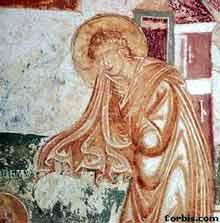Readings:
Proverbs 4:10-18
Psalm 128
James 1:17-18
Luke
23:50-56
Preface of a Saint (1)
[Common of a Saint]
[For All Baptized Christians]
PRAYER (traditional language)
Merciful God, whose servant
Joseph of Arimathaea with reverence and godly fear prepared the body
of our Lord and Savior for burial, and laid it in his own tomb: Grant,
to us thy faithful people grace and courage to love and
serve Jesus with sincere devotion all the days of our life; through the
same Jesus Christ our Lord, who liveth and reigneth with thee and the
Holy Spirit, one God, for ever and ever.
Amen.
PRAYER (contemporary language)
Merciful God, whose servant
Joseph of Arimathaea with reverence and godly fear prepared the body of
our Lord and Savior for burial, and laid it in his own tomb: Grant to us,
your faithful people, grace and courage to love and serve Jesus with sincere
devotion all the days of our life; through Jesus Christ our Lord, who lives
and reigns with you and the Holy Spirit, one God, for ever and ever. Amen.
Lessons revised at General Convention 2024.
Return to Lectionary Home Page
Webmaster: Charles Wohlers
Last updated: 10 July 2024
JOSEPH OF ARIMATHAEA
(1 AUGUST NT)
 The
Gospels tell us (M 27:57-61; P 15:42-47; L 23:50-56; J 19:38-42) that
after the death of Jesus, Joseph of Arimathaea, wealthy, a member of the
Council, asked Pilate for the body of Jesus, and buried it with honor
in the tomb he had intended for himself. This is our only information
about him from writers of his own century.
The
Gospels tell us (M 27:57-61; P 15:42-47; L 23:50-56; J 19:38-42) that
after the death of Jesus, Joseph of Arimathaea, wealthy, a member of the
Council, asked Pilate for the body of Jesus, and buried it with honor
in the tomb he had intended for himself. This is our only information
about him from writers of his own century.
Later tradition has embellished this account. (If not interested in folklore, skip to the closing prayer.) It is said that Joseph was a distant relative of the family of Jesus; that he derived his wealth from tin mines in Cornwall, which he visited from time to time; and that Jesus as a teen-ager accompanied Joseph on one such visit. This is the background of the poem "Jerusalem," by William Blake, which begins:
And did those feet in ancient time
Walk upon England's mountains green?
And was the holy Lamb of God
On England's pleasant pastures seen?
And did the countenance divine
Shine forth upon our clouded hills?
And was Jerusalem builded here
Among those dark satanic mills?
Bring me my bow of burning gold!
Bring me my arrows of desire!
Bring me my spear! O clouds, unfold!
Bring me my chariot of fire!
I will not cease from mental fight,
Nor shall my sword sleep in my hand,
Till we have built Jerusalem
In England's green and pleasant land.
-- William Blake (1757-1827)
[Click here for a video of the music.]
 |
| Joseph of Arimathaea with the body of Christ. From an old (1811) Book of Common Prayer. |
Has the Glastonbury legend any basis at all in history? Two facts and
some speculations follow:
Tin, an essential ingrediant of bronze, was
highly valued in ancient times, and Phoenician ships imported tin from
Cornwall. It is a pretty safe guess that in the first century the investors
who owned shares in the Cornwall tin trade included at least a few Jewish
Christians.
Christianity gained a foothold in Britain
very early, probably earlier than in Gaul. It may have been brought there
by the traffic of the Cornwall tin trade. If so, then the early British
Christians would have a tradition that they had been evangelised by a wealthy
Jewish Christian. If they had forgotten his name, it would be natural to
consult the Scriptures to see what mention was made of early wealthy Jewish
converts. Joseph and Barnabas are almost the only ones named, and much
of the life of Barnabas is already accounted for by the book of Acts, which
makes him an unsatisfactory candidate. Hence, those who do not like to
be vague would say, not, "We were evangelised by some wealthy Jewish Christian
whose name we have forgotten," but, "We were evangelised by Joseph of Arimathaea."
Why spend time on any of the above? Because the folk-tales of a community are part of the heritage of a community. Someone wishing to understand the United States will be well advised to familiarize himself with the stories of George Washington's cherry tree and Paul Revere's ride, although he ought not to confuse them with history.
by James Kiefer
For more about Glastonbury and the connection to Joseph of Arimathaea,
see: https://www.britainexpress.com/Myths/Glastonbury.htm and http://theconversation.com/glastonbury-archaeology-is-revealing-new-truths-about-the-origins-of-british-christianity-93805
Note also that Paul Revere's ride really did occur, but not exactly as in Longfellow's poem - he never made it to Concord, having been captured by the British after leaving Lexington.